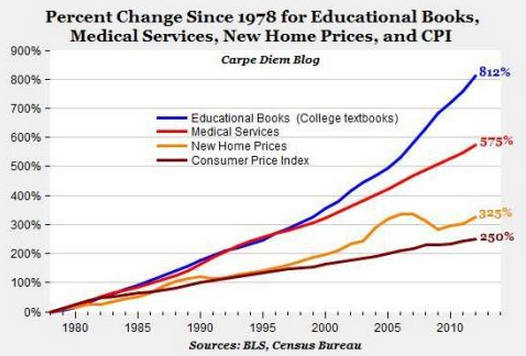Introduction of the problem
Education is one of the most crucial things in one’s life. If a person wants to reach heights of his professional career, he/she has to have a solid educational background. But unfortunately, acquiring education has become a very costly affair, with the escalating prices of educational institutions.
Concurrently, it is astonishing to note that the cost of textbooks has increased more frequently and by considerable margins. This increase in the cost of textbooks has not only baffled the students and their family members, but also the members of parliament and the US Congress. The government is concerned about the fact that the prices of textbooks are more in the United States than that of the same textbooks in the United Kingdom and other nations (“US rage at textbook price hike” par. 2).
The problem is being attributed to the fact that publishers come out with frequent new editions, which prevents the students to avail the cost benefit of second hand textbooks. Isn’t it unethical? Yes, it is unethical because the publishers are bent on making huge profits out of the pockets of the students’ parents.
Unfortunately, there are students who can’t afford to buy such costly textbooks and have to manage without them. This obviously affects their studies and students, who are otherwise bright in studies, can’t perform better due to the absence of textbooks.
Another drawback of incessant new editions of textbooks is that the students desist from buying new books because they tend to become obsolete very soon. Then what’s the point in buying such costly books? Moreover, the trend of being digital has transformed the students’ approach towards the printed matter (Taylor 1).
According to an article in The Huffington Post, it is estimated that during the past 30 years, the cost of textbooks has increased by 812 percent (Kingkade 2). The National Association of College Stores claims that a student’s annual expense on textbooks is $655, whereas, the College Board’s suggests it to be $1168 (Medeiros 4). The graph below depicts the comparison of increase in prices of different products/services.

Solutions available
There are various solutions available in the market to avoid purchasing costly textbooks. Several other options have been proposed by people in this field. Let us discuss such solutions one by one:
- Renting of textbooks: This is a good option for the students who can’t afford buying their textbooks. But in my opinion, there is a drawback in this option. It is a common habit of students to enter small notes in their textbooks. This can be distracting for other students who hire the textbooks. It is also possible that the notes mentioned in the textbooks are not correct and this may send wrong message to the reader. Moreover, the rent of textbooks is also not economical. There is not much difference in the cost of purchasing and taking on rent. Kurtzleben sites an example where the cost of purchasing a second-year political science book was $35 and the rent was $22.75 (Kurtzleben 3).
- Free online textbooks: Even this particular option is a good one. But the problem is that all the books are not available online for free. In fact, the publishers have the sole rights to the content of the books that they publish and as such, they charge for such textbooks. On the contrary, there are some alternate materials also. These are called the “open educational resources”. Such “open textbooks” are available online for free (Marklein 3).
- There is also a trend of exchanging books in schools and colleges. The students going to higher standards give their books to their juniors and take second hand books from their seniors. Even though this is a good option, what happens if the publishing companies come with new editions?
Best solution
The options mentioned above have their pros and cons. But in my opinion, the best option to tackle the rising prices of textbooks lies with the educational institutions themselves. First of all, the government should ensure that the publishers are not allowed to publish new editions every now and then.
The syllabus of courses should be fixed for some years to come. As a social aid program, the state governments should set aside certain budget for the educational institutions to allow them to purchase a certain number of textbooks each year – depending on the strength of students.
The educational institutions, in turn, should issue textbooks (on annual basis) to students with instructions that they should not spoil the textbooks. A nominal penalty is advisable for students who submit mutilated or spoiled textbooks after the completion of the year. This way, the students will develop a sense of responsibility as well.
Governments are doing a lot for the society and I am sure if this is done, the nation will have more bright graduates every year who will contribute towards the overall progress of the society and the nation.
Works Cited
Kingkade, Tyler 2013, College textbook prices increasing faster than tuition and inflation. Web.
Kurtzleben, Danielle 2012, How your textbook dollars are divided up. Web.
Marklein, Mary 2012, Groups target textbook prices to rein in college costs. Web.
Medeiros, Amy 2013, Rising textbook prices highest in 30 years. Web.
Taylor, Timothy 2011, Sky-high textbook prices – and my suggested solution for intro economics. Web.
US rage at textbook price hike, 2006. Web.